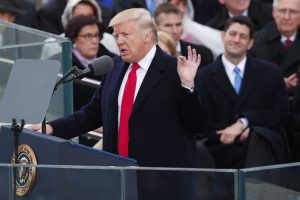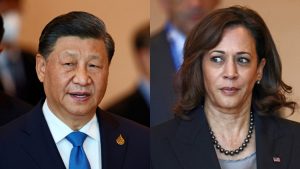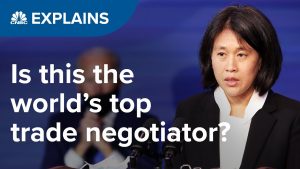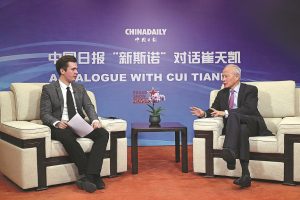
Well, I guess we shouldn’t have been surprised. But since I’ve never spent time listening to Trump speeches – I thought I would listen to Trump’s Second Inaugural . As David Bernstein et al. at the Substack, “Good Politics/Bad Politics” called it: “An Ugly Speech”. And it was. On reflection, and notwithstanding his early invocation of, ““The golden age of America begins right now,” in fact it was really a version two of “American Carnage”. As David Bernstein and colleagues declared:
“Normal inaugural addresses are inclusive. Trump? There was little or nothing in this speech for anyone but his strongest supporters. The framing of it was, as is always the case with Trump, outright insulting to everyone else: The nation has been absolutely horrible for the last four years, in his telling, with not even a hint that its leaders have been trying to do their best even if they differ on what to do.”
“This ugly speech will be forgotten rapidly. But if there was anything there to even give him a bit of a honeymoon approval bump, I sure didn’t see it.”
“Trump’s inauguration speech was very much directed toward such supporters. Despite claims that unity would be a major theme, the speech was a typical Trump litany of gripes about the left, praises for his unique ability to fix things, and recitation of plans that can at best be called controversial.”
In the NYTimes, “Morning Briefing” Emmett Lidner declared just after the speech:
“The golden age of America begins right now,” Trump declared in his Inaugural Address delivered at the Capitol, shortly after he took the oath of office. Much as he did eight years ago, Trump painted a grim portrait of a country on its knees that only he could revive.”
And Paolo Magri of the Italian think tank ISPI put it this way:
“Eight years after his first inaugural address, the one about “American carnage,” Trump returned with the promise of a new “golden age” for the United States. But much of that vengeful rhetoric was still there, in tones steeped in rancor and an almost messianic inspiration for his extraordinary political comeback. “I was saved by God to make America great again,” the tycoon said in reference to the attempted assassination he was the victim of last summer. In a speech full of imperialistic overtones, Trump then announced that he would restore America’s highest peak, Mount Denali, to its former name, Mount McKinley, in honor of the Republican president assassinated in 1901. He also reiterated his intention to “pursue our manifest destiny to the stars,” promising to plant the American flag on Mars, rename the Gulf of Mexico the “Gulf of America,” and reclaim the Panama Canal.”
Finally, David French, among a number of other opinion writers, commenting on the Inauguration’s best and worst moments in the NYT said this about the Trump speech:
“The title of Trump’s speech should have been “American Carnage 2: Ultimate Carnage.” If possible, Trump’s second inaugural speech was darker than his first. Rather than seek to unite Americans, he painted the darkest possible picture of the state of the nation and the character of his opponents. And he set himself up as a kind of messiah figure, the man saved by God for the sake of national greatness. If you want to lay the groundwork for authoritarianism, that’s exactly how to do it.”
It was disheartening. Now I didn’t expect a wholesale conversion for the returning President but one could have hoped for some greater perspective with Trump 2.0. But no, I don’t think so. So, we are likely to see all his grievances and resentments dominating this President’s domestic and foreign policy.
Now I was interested in various reactions to Trump’s reactions to American foreign policy both his ongoing remarks through the election campaign and then with his full-throated approach to US foreign policy on Inauguration Day. One person of interest to me was Ben Rhodes and his views. Rhodes is a political commentator, and a former Deputy National Security Advisor for Strategic Communications and Speechwriting under President Barack Obama. With Jake Sullivan, he is the co-chair of National Security Action, a political NGO. In FA Rhodes at the end of 2024, in a piece entitled, “Democrats Need a Foreign Policy That Can Work—and Win: How to Harness Populist Energy and Build a Better International Order” displayed a strong critique of Trump :
“While Trump casts himself as a radical disrupter, he is a familiar figure in today’s world: a far-right nationalist at a time when that brand of politics is ascendant, a strongman in a world full of them.”
“Since his ascent in 2016, Trump has successfully tapped into a populist fatigue with American national security policies. He has consistently railed against forever wars, free trade, free-riding allies,an unaccountable “deep state,” and the harm that globalization has done to the working class. The irony is that, for a long time, the policies that produced these outcomes were more popular among Republicans than Democrats.”
“By fully embracing the mantle of hawkish defenders of the status quo, Democrats allowed themselves to be held responsible for the failures of the post-9/11 era.”
“At the same time, however, many Americans have come to see U.S. national security policy writ large as an instrument of a broader system that has not served their interests and is unresponsive to their concerns.”
I think it is fair to say that Trump has tapped in to that distaste for current US foreign policy and many Americans have glommed on to Trump’s strongman approach. Now having said that Rhodes sharply critiques Trump policy directions making clear the hollowness of Trump’s strongman approaches:
To be clear, the remedies that Trump is preparing to impose are not correctives to the grievances he has identified. An overuse of tariffs—combined with more sanctions and further decoupling of supply chains—would only exacerbate inflation while amplifying the geopolitical influence of China. A shift of that kind would also reduce the cost to China of a potential blockade or invasion of Taiwan. Mass deportations will tear at the social cohesion of American communities, drive up prices, and undermine the strength and vitality that the U.S. has traditionally drawn from immigrants. Tax cuts, deregulation, and a federal embrace of cryptocurrencies will fuel inequality and encourage oligarchy. The abandonment of action on climate change could have catastrophic consequences as the planet careens past a tipping point. U.S. alignment with the Israeli far right could lead to the annexation of parts of Gaza and the West Bank, with devastating consequences for Palestinians and perhaps the stability of neighboring states. The abandonment of Ukraine would lead to an end to that war on terms favorable to Russia while eroding U.S. influence in Europe. The dismantling of American national security agencies through unqualified appointments and purges of the civil and foreign service will concentrate power in the White House while undermining the long-term capacity of the government to protect the safety and interests of the American people. And these are just the things Trump has said he will do: if his COVID-19 pandemic response is any indication, there is little reason to trust that he will competently manage the inevitable crises to come. This is a harrowing thought in a world of great-power conflict.
But it is interesting to contemplate the consequences of Trump foreign policy. And of course there is no consensus here, I suppose not surprisingly. For instance, there was the recent FA piece by Richard Fontaine titled: “The Trump-Biden-Trump Foreign Policy: American Strategy’s Strange Continuity”. Fontaine, interestingly, is currently CEO of the Center for a New American Security but earlier in his career, he was a foreign policy adviser to U.S. Senator John McCain. Now interestingly Fontaine suggests a rather muted policy by Trump with continuity between the two administrations – Biden-Trump:
“The two administrations [Trump, Biden] could hardly have been more different in style and rhetoric. In the underlying substance of their policies, however, there was more continuity than the casual observer might have appreciated.”
“Many such areas of constancy will almost certainly remain in the next Trump presidency. The incoming administration’s approach to Israel, for instance, will likely be broadly similar, combining military support with protection both from Iranian missiles and diplomatic attacks at the United Nations and elsewhere. Policy toward Saudi Arabia will be comparable now that Biden has embraced the government in Riyadh and seeks regional normalization. Under Trump, Washington is poised to continue to see China as its foremost global challenger and endeavor to build domestic sources of strength. Even as the new administration rails against U.S. allies on issues such as defense spending and trade, it is likely to seek tighter partnerships abroad, particularly in the Indo-Pacific, to better compete with Beijing.”
“Trump will usher in departures, sometimes dramatic ones, in American foreign policy. But those changes will compose just a fraction of the total. The stability of U.S. interests and values, the role of Congress, and the realities of today’s world will demand a significant measure of constancy. Although it is bent on reversing Biden’s approach, the incoming team may itself be surprised to find out how much the two administrations share.”
Now you’ll not be surprised that this view of similarity between the two administrations is not universally held. I was intrigued by my colleague Dan Drezner’s piece in WPR, where, apparently, Dan is now providing a monthly opinion piece. I was alerted to it by Dan at his Substack, Drezner’s World, rather chillingly titled, “A Great Power War is Coming: The implicit assumption behind a lot of recent rhetoric.” Dan was particularly sparked by Trump’s territorial threats – to the Panama Canal, Greenland and Canada. He reacted in the article this way:
“I have a very depressing answer: “Fear of a Great Power War Could Be Making One More Likely.”
As he says the following is his thesis paragraph:
“What is going on? There are some disturbing parallels between how great powers are behaving today and how they started behaving in the late 1930s. In both eras, the proliferation of economic sanctions and embargoes caused great powers to fear that they would be cut off from critical resources. Their reaction to that threat, in turn, helped to escalate great power conflict. The question today is whether history will repeat itself, or only rhyme.”
He then provides the following conclusion:
“For decades, the principal sources of great power peace have been clear: U.S. hegemony, commercial interdependence and nuclear deterrence. But really, there was a fourth pillar as well: whether elites in these countries were seriously contemplating the mechanics of a sustained great power war. For much of the post-Cold War era, that was inconceivable.”
“In 2025, U.S. hegemony looks wobbly, and great powers are falling all over themselves to reject interdependence unless it favors them asymmetrically. Increasingly, elites in the U.S. and China seem to be conceiving of how a war between the two countries would play out. Which means we may be about to test whether the last pillar of great power peace—the logic of mutually assured destruction—remains compelling or not.”
Now I must say my initial reaction was – really! It is possible of course, but I suspect not all that likely. My reaction to the proposition offered by Dan is in part driven by my caution when being offered historical analogies. They are superficially attractive, and frequently employed but such comparisons should be treated with strong caution. If you’re going to use an historical analogy you examine the similarities, of course, but you need to also look at the dissimilarities before declaring it an appropriate lesson. Few authors ever do; it takes a fair bit of work and rather deep historical knowledge. And I’m afraid it was done in this case, though practically few authors or experts do. Still in the end mark me skeptical.
So we enter the age of ‘Trump 2.0’. Fasten your safety belts. It is going to be a bumpy ride, for sure.
Image Credit: NY Times



